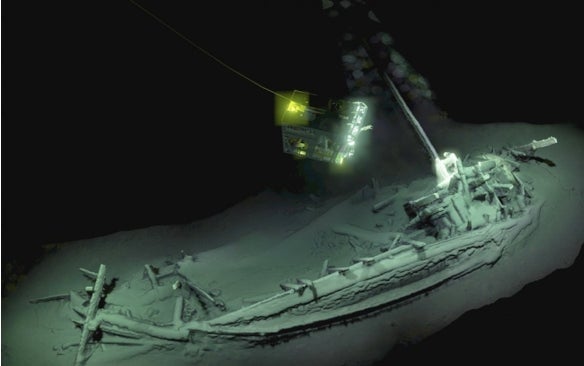Archaeologists discover a 2,400-year-old shipwreck, perfectly preserved
Archaeologists are patient professionals, slowly piecing together bits of the past with mysterious scraps, the stubborn detritus of days gone by—bits of pottery, old bones, a partial message etched in stone. Sometimes, however, they get very lucky and make a discovery of a relic that’s intact and can rewrite history, or at least reveal it more completely.


Archaeologists are patient professionals, slowly piecing together bits of the past with mysterious scraps, the stubborn detritus of days gone by—bits of pottery, old bones, a partial message etched in stone. Sometimes, however, they get very lucky and make a discovery of a relic that’s intact and can rewrite history, or at least reveal it more completely.
That’s what happened when a group of archaeologists embarked on a three-year search for shipwrecks in the Black Sea. More than a mile below the water’s surface, on the sea floor, lay a 2,400-year-old vessel they believe to be from ancient Greece. Due to a lack of oxygen at those depths, the ancient ship has lain undisturbed, with masts, rudders and rowing benches all preserved. “We believe we now have an unparalleled archive of data with which to address these big questions about the human past,” the international research team on the Black Sea Maritime Archaeology Project (MAP) explain on the project website.

The ship was found in the waters off of what is now Bulgaria and is believed to be an ancient Greek trading vessel of a kind previously only seen depicted on Greek pottery. The 75-foot vessel is a treasure for archaeologists. “This will change our understanding of shipbuilding and seafaring in the ancient world,” according to principal investigator Jon Adams.
The MAP project, hosted by the UK’s University of Southampton, involves maritime archaeologists, scientists and marine surveyors from around the world. They have spent the past three years surveying the Black Sea, where thousands of years ago large land masses were inundated as the water level rose after the last Ice Age. Researchers have scoured the sea floor and the sediment for wrecks and have come upon 60 boats so far—including a 17th-century Cossack raiding fleet, Roman trading vessels, and ships from the Ottoman and Byzantine periods.
The highlight of their finds is the ancient Greek vessel. “A ship surviving intact from the classical world, lying in over two kilometers of water, is something I would never have believed possible,” Adams marvels. Previously, the oldest intact shipwreck ever found was a 400-year-old vessel discovered in the waters of Portugal.
The ancient vessel will remain where the researchers found it. They did carbon date a part of the ship to confirm its age. And based on the age and shape, archaeologists are convinced it’s a literal classic. The wreck looks like vessels painted on the side of ancient Greek pottery, such as the “Siren Vase” in the British Museum, the Guardian reports.
The Black Sea project has been interesting to researchers because it reveals building techniques going as far back as ancient Greece. And it shows globalization is old news. The project website explains that their underwater finds “represent an unbroken pattern of trade and exchange, warfare and communication that reaches back into prehistory.” It calls the assemblage of newly discovered shipwrecks “one of the finest underwater museums of ships and seafaring in the world.”